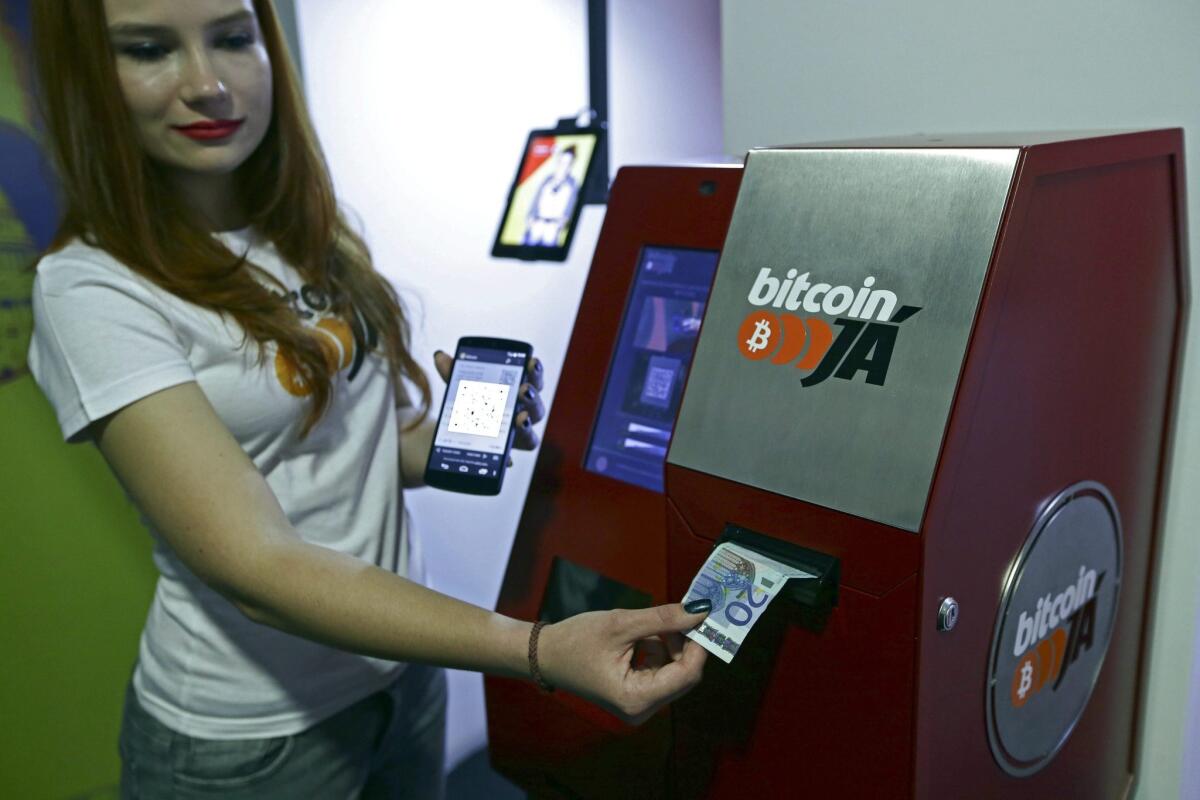Bye-bye, bitcoin? The crypto-currency’s price agonies intensify

- Share via
Remember bitcoins?
The digital currency swam into the average person’s attention last December, when the price of a single bitcoin reached about $1,150. The Winklevoss twins, who gained fame from their connection with the founding of Facebook, announced plans for a bitcoin investment fund. The airwaves and news columns loaded up with declarations about how bitcoins were the biggest threat to the banking system since bankers were invented. The bitcoin creed was about defeating evil central bankers with freedom and libertarianism.
Since then thousands of businesses announced they would accept bitcoins for goods and services. That level of interest should have kept the price of bitcoins stable, because theoretically their value is tied to their acceptance.
What’s happened instead is that the price of bitcoins has plummeted, especially over this past weekend. The coins were quoted late Monday at $333.88 by CoinDesk, a bitcoin information service, up a bit after bottoming out at about $290. Many of the bitcoin faithful are in paroxysms of grief over the price collapse.
The main problem is that no one in the bitcoin community can adequate explain the price action. Accordingly, rumors and speculation abound. Some think it’s the advent of new regulations on “virtual currencies” coming from New York State banking regulators.
Another theory is that Chinese computer programmers have sharply stepped up their “mining” of bitcoins. (The bitcoin supply can be increased only when programmers solve an increasingly complex algorithm, which requires ever-more-powerful computers.) Some even think that bitcoin’s success in the marketplace is its own enemy, on the theory that merchants accepting bitcoins rapidly convert them to dollars or other hard currencies, which drives down the price. And then there are bitcoin believers who dismiss the plunge as merely an artifact of bitcoins’ natural volatility.
What’s hard to dispute is that the long-term price decline underscores the dangers of bitcoins as an investment. As we observed last year, bitcoin fans can be divided roughly into two categories: investment enthusiasts and transactional users.
Investment enthusiasts see bitcoins as the next best thing to gold--a currency/commodity that will retain intrinsic value, or even gain value, as the world goes to hell. Just as gold never loses its glitter, the argument is that bitcoins are immune from manipulation from the gnomes of international finance in central banks and central governments.
For those who bought into this argument and collected bitcoins as the price rose to $1,000 and beyond, the decline is nauseating. One investor’s post on reddit.com’s r/bitcoin forum was headlined “Desperate: How long to hold out / What would you do in my situation.” The poster said he or she already had lost more than $100,000 this year, on an investment at an average cost of $623 per coin. “So far i am down a lot.” (No kidding.)
For those who use bitcoins as transactional instruments--that is, to move money in and out of currencies or across national borders without financial authorities interfering--the price might be irrelevant. That’s the view of Stanford University economist Susan Athey, an expert in crypto-currencies. Athey told us last year that if you’re selling goods in bitcoins and exchanging them for dollars, or trying to transfer your wealth from yuan in Beijing to euros in Frankfort, “in principle, you need to only worry about the exchange rate for 10 minutes.... The point is that we have a new technology that allows any individual in the world to send value from one place to another instantly, in a way that’s secure and verifiable.”
Yet even for users, there may still be reason for concern. One theory about the price decline is that it’s the handiwork of manipulators. The bitcoin exchange merchant community--firms that handle those transfers of dollars, yuans and euros to bitcoins and back again--has suffered more than its share of frauds, thefts, collapses and other mishaps over the last year or two. The idea is far from comforting that bitcoins have sustained a major drop in value without an explanation that everyone can agree on.
If this goes on much longer, much less intensifies, even faithful users of bitcoins will begin to think twice. They’ll move on to alternative new means of exchange without the drawback of bitcoins, which Federal Reserve economist Francois Velde has described as a currency “based on an extremely complex code understood by only a few...without accountability, arbitration or recourse.”
Keep up to date with the Economy Hub. Follow @hiltzikm on Twitter, see our Facebook page, or email mhiltzik@latimes.com.
More to Read
Inside the business of entertainment
The Wide Shot brings you news, analysis and insights on everything from streaming wars to production — and what it all means for the future.
You may occasionally receive promotional content from the Los Angeles Times.











